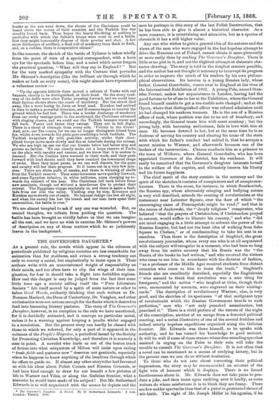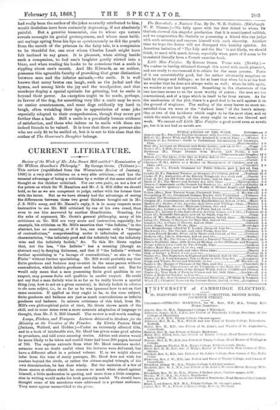THE GOVERNOR'S DAUGHTER.*
AS a general rule, the novels which appear in the columns of periodicals published by religious societies are less remarkable for animation than for staidness, and evince a strong tendency not only to convey a moral, but emphatically to insist upon it. Their authors write with an unaccustomed weight of responsibility on their minds, and too often have to clip the wings of their ima- gination, for fear it should take a flight into forbidden regions. How real this danger is may be judged from the fact that some little time ago a society calling itself the "Pure Literature Society " felt itself moved by a spirit of some nature or other to taboo Good Words, evidently thinking that such writers as Dr. Norman Macleod, the Dean of Canterbury, Dr. Vaughan, and other ecclesiastics were not serious enough for the flocks which it desired to lead into becoming literary pastures. The story of The Governor's Daughter, however, is an exception to the rule we have mentioned, for it is decidedly animated, and it conveys no particular moral, unless it be a warning against keeping a poodle whilst engaged in a revolution. But the present story can hardly be classed with those to which we referred, for only a part of it appeared in the columns of the People's Magazine, a periodical issued by the Society for Promoting Christian Knowledge, and therefore it is scarcely a ease in point. A novelist who leads us out of the beaten track of fiction into what misquoters of Milton will insist upon calling "fresh fields and pastures new" deserves our gratitude, especially when he happens to know anything of the localities through which be offers to guide us. If almost any other storyteller had favoured us with his ideas about Polish Counts and Russian Generals, or had been kind enough to draw for our benefit a few pictures of life in Warsaw and Vilna, or along the Galician frontier, what a travestie he would have made of his subject! But Mr. Sutherland Edwards is so well acquainted with the scenes he depicts and the * The Governor's Daughter, A Novel. By H. Sutherland Edwards. 2 vols. London: Tinsley. 1868.
men he portrays in this story of the last Polish Insurrection, that he has been able to give it almost a historical character. As a mere romance, it is entertaining and attractive, but as a species of chronicle it has a still higher value.
Any one who wishes to gain a general idea of the natures and the views of the men who were engaged in the last hopeless attempt to drive the Russians out of Poland, cannot obtain it more pleasantly or more easily than by reading The Governor's Daughter. Thera is little or no plot in it, and not the slightest attempt at elaborate cha- racter-drawing. The story is told in the simplest manner possible, and the author has not thought it necessary to interrupt its progress in order to improve the minds of his readers by his own philoso- phical observations. Its heroine is a young Russian lady, whose father, General Gontchalin, comes over to Englaud at the time of the International Exhibition of 1862. A young Pole, named Stan- isles Ferrari, makes her acquaintance in London, having had the good fortune to be of use to her at the Exhibition, where the General found himself unable to get a ten-rouble note changed ; and at the Opera, where that distinguished officer was refused admission until he had changed his nankeen trousers. He is the son of a Russian officer of rank, whose position was due to an act of treachery, and accordingly, the General treats him with scant courtesy ; but the young lady, with becoming enthusiasm, falls in love with him at once. He becomes devoted to her, but at the same time he is so desirous of serving his country and clearing his name of the stain with which his father's conduct had sullied it, that he accepts a secret mission to Warsaw, and afterwards becomes one of the leaders of the insurrection. Chance conducts him as a prisoner to the town of Wilkovo, where General Gontchaliu, who has been appointed Governor of the district, has his residence. It will easily be conceived that the Governor's daughter interests herself in the welfare of the captive, and ultimately insures his liberty and his future happiness.
The chief merit of the story consists in the accuracy and the spirit of the sketches it contains of conspirators and of conspirator- hunters. There is the scene, for instance, in which Boutkovitch, the Russian spy, whose alternately cringing and bullying nature is very well described, attends the meeting of revolutionists at the restaurant near Leicester Square, over the door of which "the encouraging name of Prszemyslski might be read ;" and that in the rooms of Jankowski, the "deeply religious" conspirator, who believed "that the prayers of Christendom, if Christendom prayed in earnest, would suffice to liberate his country," and who "did not mind engaging in a little attempt to subvert the power of the Russian Empire, but had not the least idea of walking from Soho Square to Chelsea," or of condescending to take his seat in an omnibus. Then there is the description of Siegfried, the great revolutionary journalist, whom every one who is at all acquainted with the subject will recognize in a moment, who had been so long away from his native country that his Russia was the "the Russia of the books he had written," and who received the visitors who came to see him in accordance with the dictates of fashion, "as a professor of the Middle Ages received students from distant countries who came to him to learn the truth." Siegfried's friends also are excellently described, especially the Englishman "who seemed to think that revolution was a nice thing for foreigners," and the nobles "who laughed at titles, though their own, surmounted by coronets, were engraved on their visiting- cards." The description of revolutionary Warsaw, also, is very good, and the sketches of its specimens "of that malignant type of revolutionist which the Russian Government breeds to such perfection," men who "not only preached assassination, but practised it." There is a vivid picture of the terrors of the night of the conscription, another of an escape from a detected political meeting, and a series illustrative of one of the several fruitless and indeed utterly hopeless expeditions organized along the Galician frontier. Mr. Edwards was there himself, so he speaks with authority, and he has turned his knowledge to good account. It will be well if some of those orators whose fine-sounding speeches assisted in urging on the Poles to their ruin will take the trouble to consult The Governor's Daughter. It is not often that a novel can be mentioned as a means of studying history, but in the present case we can do so without hesitation.
To those who do not care about correcting their political impressions, the story may be recommended on account of the• light vein of humour which it displays. There is no forced facetiousness about it. Mr. Edwards does not take pains to pro- duce a joke, and then insist upon cackling over it loudly, as some writers do whose misfortune it is to think they are funny. There are few sadder spectacles than that of a jester in protracted throes of wit-birth. The sight of Mr. Joseph Miller in his agonies, if he had really been the author of the jokes so cruelly attributed to him, would doubtless have been eminently depressing, if not absolutely painfuL But a genuine humourist, one to whose eye nature reveals unsought its genial grotesqueness, and whose most brilli- ant sayings spring from his lips as spontaneously as did the pearls from the mouth of the princess in the fairy tale, is a companion to be thankful for, one over whom Charles Lamb might have felt inclined to say grace. It is pleasant, when sitting beside such a companion, to feel one's laughter gently stirred into a blaze, and when reading his books to be conscious that a smile is Tippling about one's mouth. And Mr. Edwards, as an author, possesses this agreeable faculty of provoking that great distinction between man and the inferior animals,—the smile. It is well known that many brutes can laugh, such as the jackal and the hyena, and among birds the jay and the woodpecker, and that monkeys display a special aptitude for grinning, but to smile is beyond their power. An exception ought to be made, perhaps, in favour of the dog, for something very like a smile may be seen on canine countenances, and some dogs evidently try hard to laugh, often wrinkling their lips in appreciation of some joke especially adapted to their comprehension, though they never get farther than a bark. Still a smile is a peculiarly human evidence of satisfaction, and those who induce us to smile with them are indeed friends to be valued. It is true that there are persons also who are only fit to be smiled at, but it is not to this class that the author of The Governor's Daughter belongs.































 Previous page
Previous page